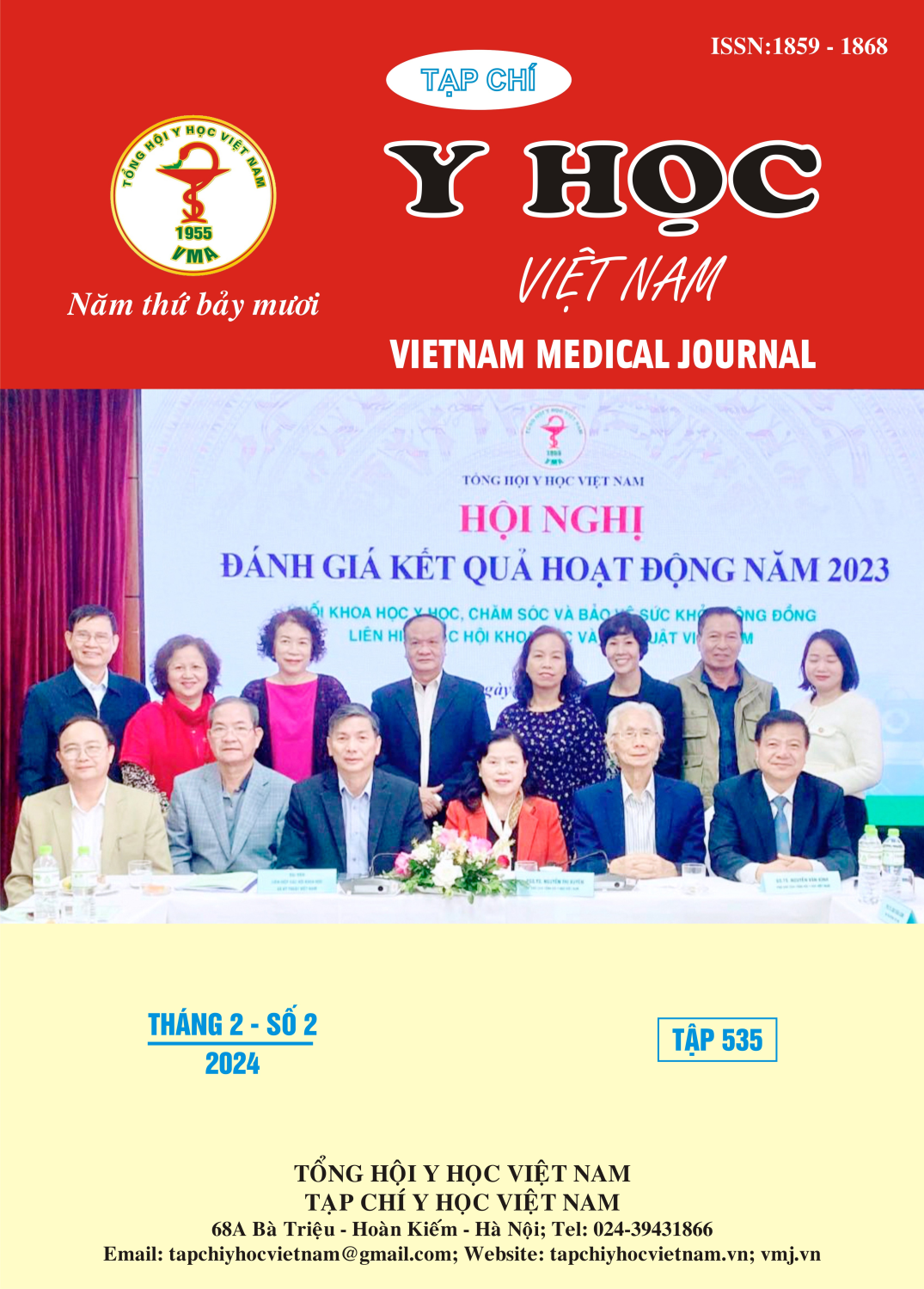EXPRESSION OF P16 MARKER IN GASTRIC ADENOMACARCINOMA CORRELATED WITH PATHOLOGICAL FEATURES ACCORDING TO WHO 2019
Main Article Content
Abstract
Purpose: Determine the status of p16 marker expression and its relationship with pathological features of gastric adenocarcinoma according to WHO 2019. Methods: A cross-sectional description on 96 patients diagnosed with gastric ADC at Bach Mai Hospital. Results: The brown-yellow staining of nucleus and cytoplasm is considered positive. P16 staining over 10% was considered positive (+) and staining under 10% as negative (-). Regarding p16 expression in 96 patients with gastric ADC, 54,2% showed positive and 45,8% showed negative. Loss of p16 expression is significantly associated with tumour size (p=0,019), tumour budding grade (p=0,023), lymphatic-vascular invasion (p=0,006), neural invasion (p= 0,03) and lympho nodes metastasis (p=0,018). There is no correlation between p16 expression and tumour location (p=0,458), macroscopic type (p=0,137), WHO histological type (p=0,468), Lauren’s type (p=0,073), depth of invasion (p= 0,122) and metastasis (p=0,33). Conclusion: P16 could be used as a prognostic marker and a diagnostic marker in many kinds of cancer. Loss of p16 expression is usually because of hypermethylation of p16INK4a promoter region. Loss of p16 were strongly correlated with development of gastric cancer. Our research indicate that p16 has a strong association with tumour size, tumour budding grade, lymphatic-vascular invasion, neural invasion and lympho node metastasis. Loss of expression of p16 is considered as a bad risk factor in gastric ADC.
Article Details
Keywords
gastric adenocarcinoma, p16, prognostic marker
References
2. Yu CC, Levison DA, Dunn JA, et al: Pathological prognostic factors in the second British Stomach Cancer Group trial of adjuvant therapy in resectable gastric cancer. Br J Cancer 71:1106-1110, 1995.
3. Adachi Y, Yasuda K, Inomata M, et al: Pathology and prognosis of gastric carcinoma: Well versus poorly differentiated type. Cancer 89:1418-1424, 2000.
4. He XS. Expression of p16 gene and Rb protein in gastric carcinoma and their clinicopathological significance. WJG. 2005;11(15):2218. doi:10. 3748/wjg.v11.i15.2218
5. Feakins RM, Nickols CD, Bidd H, Walton SJ. Abnormal expression of pRb, p16, and cyclin D1 in gastric adenocarcinoma and its lymph node metastases: relationship with pathological features and survival. Human Pathology. 2003; 34(12): 1276-1282. doi: 10.1016/j.humpath. 2003.07.005
6. Ficorella, C., Cannita, K., Ricevuto, E., Toniato, E., Fusco, C., Sinopoli, N.T., De Galitiis, F., Di Rocco, Z.C., Porzio, G., Frati, L., Gulino, A., Martinotti, S., Marchetti, P., 2003. P16 hypermethylation contributes to the characterization of gene inactivation profiles in primary gastric cancer. Oncol. Rep. 10, 169-173.
7. Altun E, Calik M, Demirci E, Daloglu FT. The expressions of p16 and p21 to predict the clinicopathological behavior and prognosis of gastric cancer. Journal of Experimental and Clinical Medicine. Published online 2015.
8. Iwatate Y, Hoshino I, Ishige F, et al. Prognostic significance of p16 protein in pancreatic ductal adenocarcinoma. Mol Clin Oncol. 2020;13(1):83-91. doi:10.3892/mco.2020.2047
9. Myong NH. Cyclin D1 Overexpression, p16 Loss, and pRb Inactivation Play a Key Role in Pulmonary Carcinogenesis and have a Prognostic Implication for the Long-term Survival in Non-small Cell Lung Carcinoma Patients. Cancer Res Treat. 2008; 40(2):45. doi: 10.4143/crt.2008. 40.2.45
10. Zhou N, Gu Q. Prognostic and clinicopathological value of p16 protein aberrant expression in colorectal cancer: A PRISMA-compliant Meta-analysis. Medicine. 2018;97(12):e0195. doi:10. 1097/MD.0000000000010195


